Partial dentures for back teeth are fake teeth that fill spaces where some back teeth are missing. The back teeth are also known as molars. It provides the force that enables you to chew food easily. When some of these teeth are missing, it gets hard to eat.
A partial denture clips onto nearby teeth and stays in place. It is made from plastic, metal, or a soft, flexible material. Some types can be taken out, while others stay in your mouth. Dentists make the denture fit your mouth. Once the dentures fit well into the patient’s mouth, they can feel like real teeth.
This article covers partial dentures for back teeth, their types, costs, care tips, and alternatives like bridges or implants.
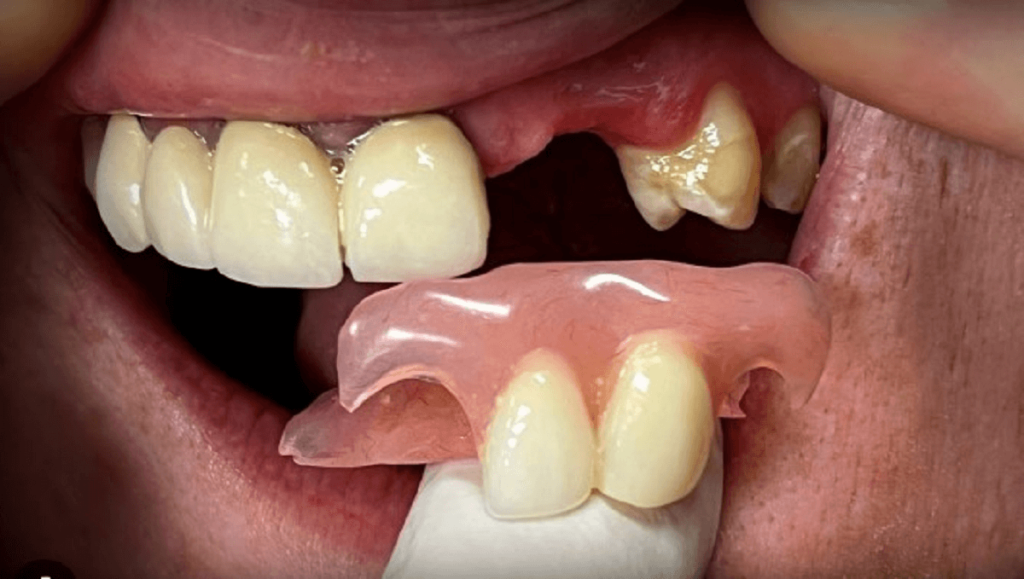
Who Needs Partial Dentures for Back Teeth?
Missing back teeth can cause problems during chewing, speaking, and swallowing. Partial dentures for back teeth help fix these issues in a simple way. Here are the criteria for following people who get this procedure.
– Missing One or More Back Teeth
If you have gaps between your back teeth, partial dentures can help. They fill the space and stop nearby teeth from shifting. Many people get them to bring back a normal bite. The partial dentures for back molars can make eating and speaking feel easier again.
– Trouble Chewing Food
Back teeth do most of the chewing, and losing them makes eating hard. You may start avoiding certain foods. Partial dentures for back teeth help people chew better and enjoy meals again. If you can’t chew well, this may be the fix you need.
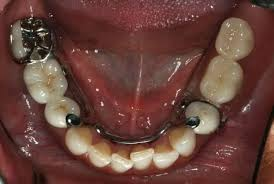
– Not a Fit for Implants
Some people can’t get dental implants because of health, weak bones, or cost. If you’re one of them, partial dentures for back teeth provide a safe and low-cost option. They don’t need surgery and still work well. It makes them a smart choice for many.
– Shifting or Loose Teeth
When a tooth goes missing, nearby teeth often move out of place. It creates a hurdle in swallowing the food. The best partial dentures for back teeth fills the space and keeps other teeth steady. If your teeth are shifting, this may help stop it.
– Low Confidence from Gaps
Even if the gap is in the back, it can still affect how you feel. Some individuals stop smiling or avoid talking much. If you feel shy because of missing teeth, a partial denture can help. It brings back confidence and comfort.
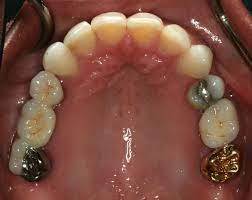
Benefits of Partial Dentures for Back Teeth
Partial dentures save people from bone loss and bone stiffness problems. Below are some special benefits that matter a lot in your daily life.
– Keeps Your Jaw Aligned
When your back teeth are missing, your bite can go out of balance. This can make your jaw feel sore or bleed after chewing. Partial dentures for back teeth help keep both sides of your mouth working the same. This stops uneven pressure and helps your jaw stay straight.
– Reduces Wear on Front Teeth
If you lose your back teeth, you may start using your front teeth at every meal. These teeth wear down fast. Because the front teeth are not made for heavy chewing. Partial dentures take the pressure off your front teeth and help them last longer.
– Helps with Clearer Speech
Missing back teeth can change your chewing and speaking patterns. It sounds like “s” or “sh” may come out wrong. You may not notice it at first, but others might. A well-fitted denture helps your tongue move the right way. This makes your speech sound clearer and more natural.
– Keeps Gums from Getting Sore
If you chew without back teeth, your gums take more of the force. This can lead to sore spots or swelling and bleeding on gums. Partial dentures spread out the pressure when you bite down. This protects your gums and helps avoid pain later.
Types of Partial Dentures for Back Teeth
Generally, there are three main types of partial dentures for back teeth that replace the old or missing back teeth. Each type has its own criteria, pros, and cons. Here are the detailed explanations of each type.
1) Removable Partial Dentures (RPDs)
These are false teeth attached to a plastic or metal base. They attach onto nearby natural teeth and can be taken out any time. They are built to fill one or more spaces where back teeth are missing. It prevents the healthy teeth from moving.
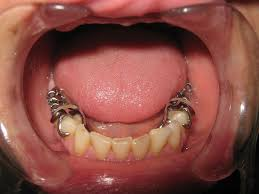
This type of denture is best for people missing several back teeth on one or both sides. People who want a budget-friendly and non-surgical fix often choose this type.
Pros:
- Easy to take out and clean.
- Costs less than fixed options.
- Can replace several missing teeth.
- No surgery needed.
- Repairs are usually simple.
Cons:
- Metal clips may show when smiling.
2) Flexible Partial Dentures
These types of partial dentures for back teeth are made from soft, bendy plastic. They fit around your gums and teeth without metal clips. These dentures bend as you move your mouth and feel lighter than regular RPDs. They also look more natural. This type is best for people with sensitive gums or uneven bones. It’s also good if you’re allergic to metal or don’t want visible parts.

Pros:
- Softer on the gums.
- No metal parts show.
- Natural look and feel.
- Good for sore or bumpy gums.
- Easy to wear and remove.
Cons:
- May stain if not cleaned well
3) Fixed Partial Dentures (Dental Bridges)
These are fake teeth that are cemented in place. They use nearby teeth as anchors to hold the bridge steady. Unlike other types, you cannot remove a bridge. It stays in the mouth and works like real teeth. This type of partial dentures for back teeth is best for people missing one or two back teeth in a row. It’s a solid choice if you don’t want to remove your denture every day.
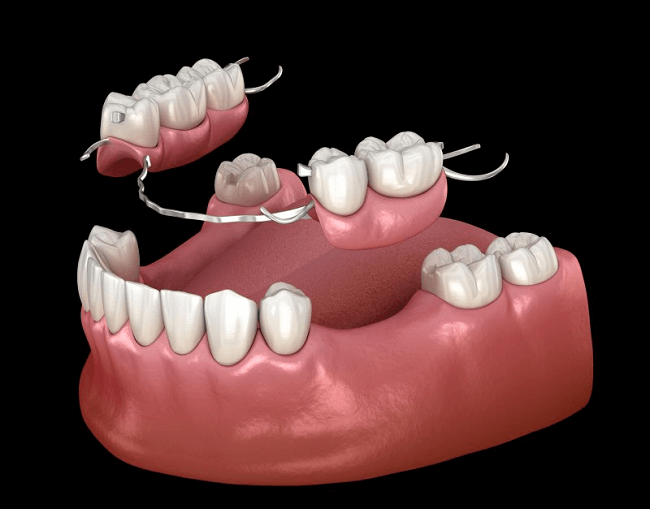
Pros:
- Feels like real teeth.
- Very stable, won’t move.
- Blends in with natural teeth.
- Durable and strong.
- Makes chewing feel normal again.
Cons:
- Needs healthy teeth next to the gap.
How Much Do Partial Dentures for Back Teeth Cost?
The cost of partial dentures for back teeth can be different for each person. It depends on the types of partial dentures, how many teeth are missing, and the material used. Some dentists use high-quality material that makes the upper back teeth partial dentures expensive.
The quality materials are expensive in the market and a lot of brands supply this material with high price tags. However, Aidite provides affordable and high-quality dental tools and materials without breaking the bank.
Furthermore, experienced dentists charge more for their reputation and expertise. Here are the average costs of all three types of partial dentures in table format.
| Type of Partial Denture | Average Cost (USD) |
| Removable Partial Denture (RPD) | $500–$1,500 |
| Flexible Partial Denture | $800–$2,000 |
| Fixed Partial Denture (Bridge) | $2,000–$5,000 |
FAQs
What are the best dentures for back teeth?
Metal partial dentures are the best for back teeth. They are strong and last a long time. They stay in place better when you chew. The metal frame is thin but tough. It fits well and feels more stable than plastic ones.
Can you wear partial dentures permanently?
Yes, you can wear partial dentures permanently if they are fixed. Fixed partial dentures or implant-supported ones stay in place in your mouth all the time. They are attached to nearby teeth. You don’t take them out like removable ones.
What is the best option for missing back teeth?
The best option for missing back teeth is dental implants. They are strong and stay in your jaw like real teeth. You can chew food better, and they don’t move around. They last a long time if you take care of them.
Final Thoughts
To sum up, partial dentures for back teeth are a helpful solution for people who have missing back teeth. You can achieve the ability to chew, speak, and smile with confidence. With different types of dentures, you can select the one that fits your needs and preferences.
Are partial dentures right for you? If you’re missing one or more back teeth, they may be the right solution. Partial dentures are affordable, easy to maintain, and can prevent your remaining teeth from shifting.
Aidite provides high-quality material that is used by dentists in dentures. Furthermore, they also provide scanners and printers that make high-quality dentures without any flaws.



